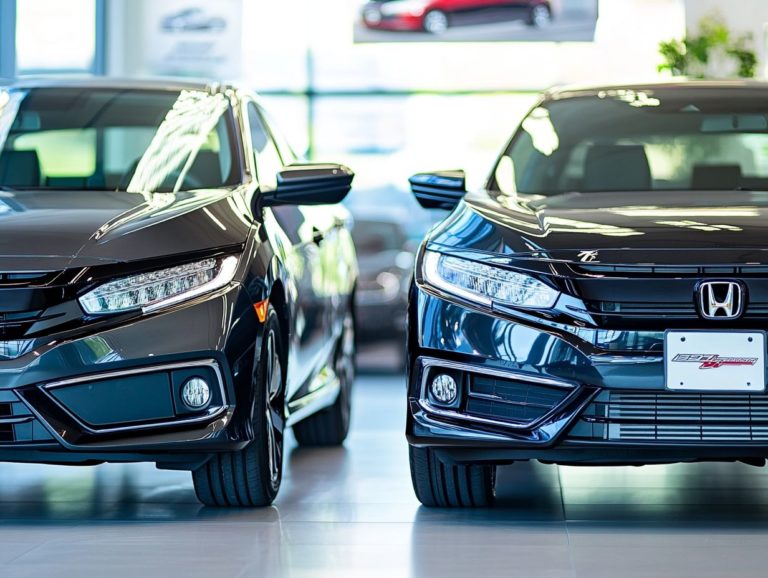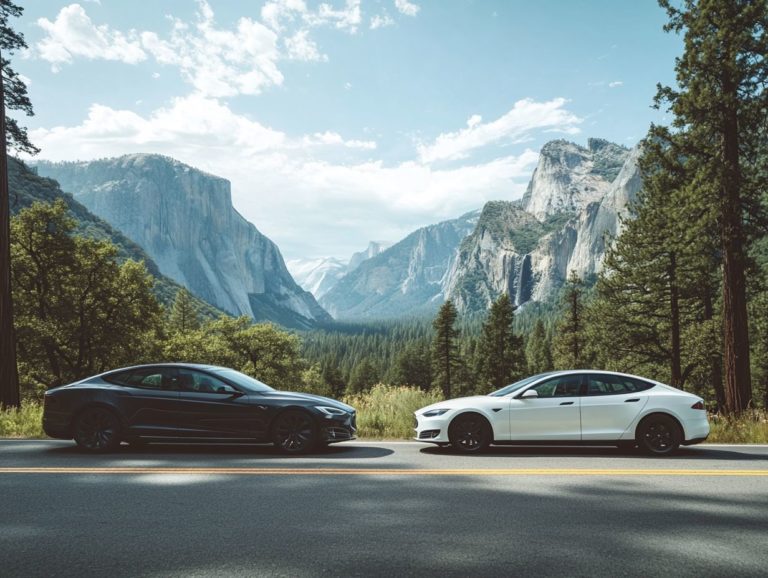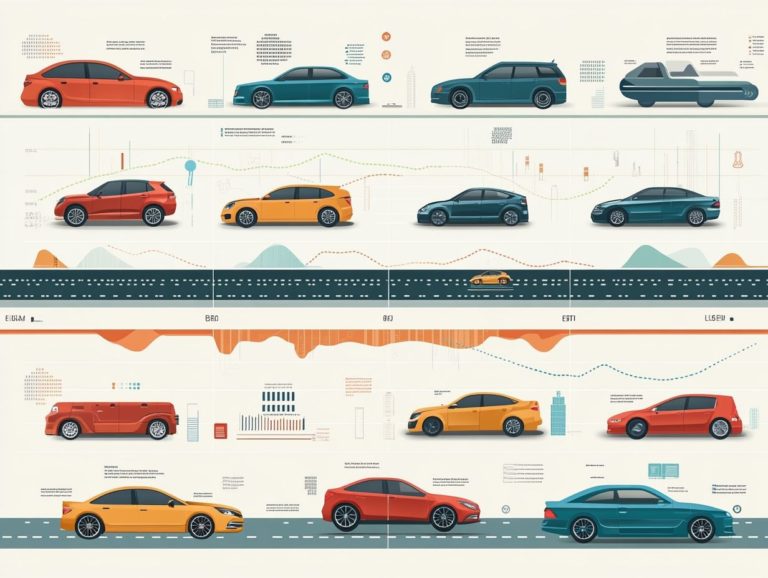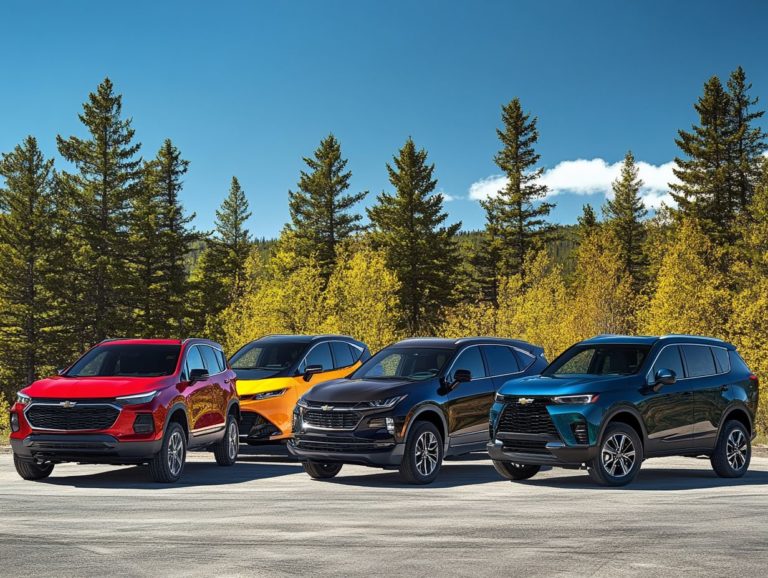2024 Hybrid Cars: Prices You Can Expect
As the automotive landscape evolves, hybrid cars are becoming increasingly popular, offering a compelling blend of efficiency and performance.
This overview delves into the many benefits of owning a hybrid vehicle in 2024, highlighting everything from financial savings to environmental impacts. You ll discover the top models on the market, their anticipated prices, and the factors that influence these costs.
The discussion will also cover government incentives, maintenance considerations, and smart tips for financing your new hybrid.
Is investing in a hybrid car worth it? Get ready to discover!
Contents
- Key Takeaways:
- 2. Benefits of Owning a Hybrid Car
- 3. Popular Hybrid Car Models in 2024
- 4. What to Expect for 2024 Hybrid Car Prices
- 5. Factors That Affect Hybrid Car Prices
- 6. Government Incentives for Hybrid Car Owners
- 7. Maintenance and Repair Costs of Hybrid Cars
- 8. Financing Options for Hybrid Cars
- 9. Comparison of Hybrid Car Prices to Gasoline Cars
- 10. Future Predictions for Hybrid Car Prices
- Is It Worth It to Invest in a Hybrid Car?
- Frequently Asked Questions
- What are some popular 2024 hybrid cars and their prices?
- How do the prices of 2024 hybrid cars compare to traditional gas-powered cars?
- Are there any tax benefits for purchasing a 2024 hybrid car?
- Are there extra costs for owning a 2024 hybrid car?
- Will the prices of 2024 hybrid cars drop in the future?
- What factors influence the prices of 2024 hybrid cars?
Key Takeaways:
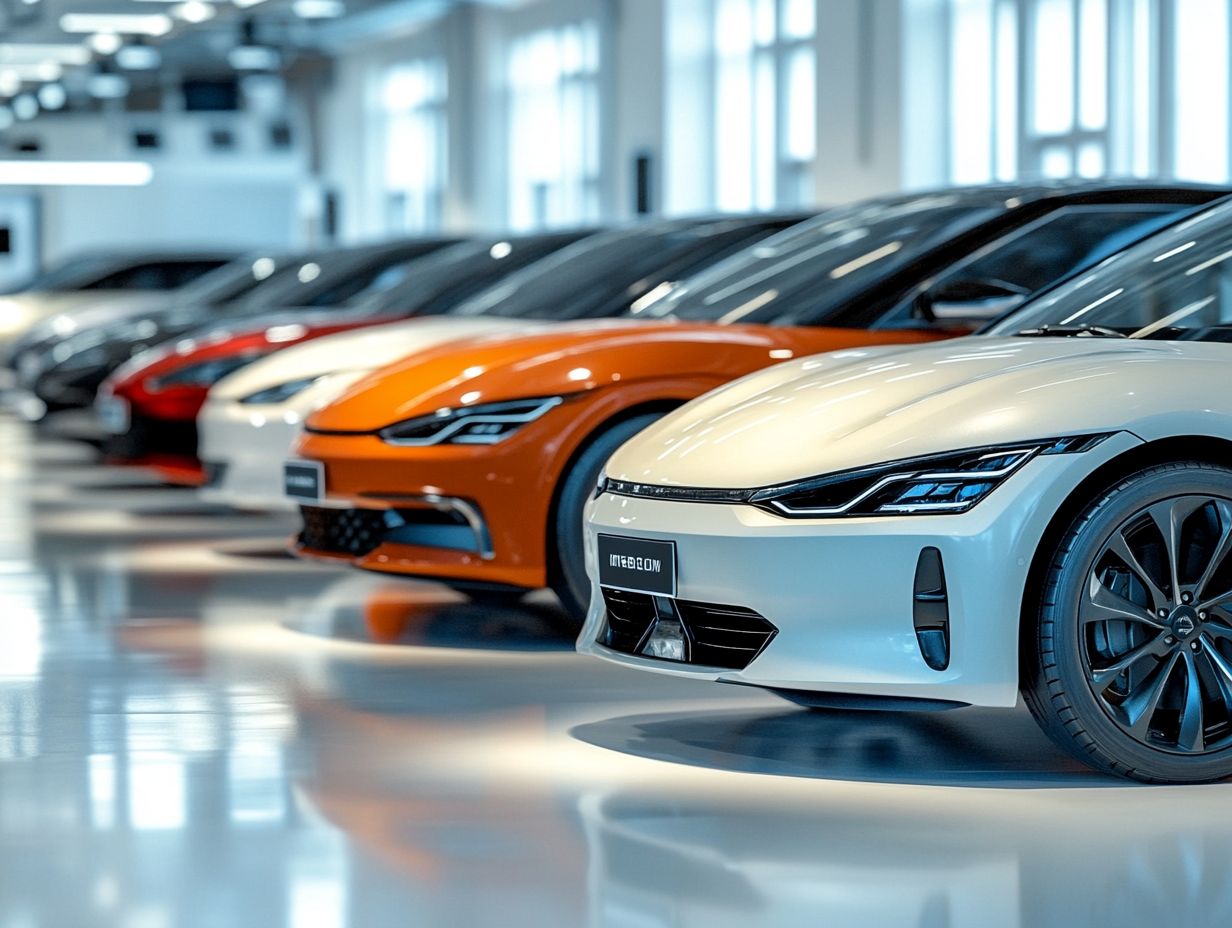
- Hybrid cars save you money and are better for the planet!
- The expected prices of 2024 hybrid cars will vary based on factors such as model, features, and government incentives.
- Investing in a hybrid car can lead to long-term savings and a positive environmental impact.
2. Benefits of Owning a Hybrid Car
Owning a hybrid car presents a wealth of advantages that you’ll surely appreciate. You can enjoy impressive fuel efficiency and big savings when filling up. Plus, you ll have a reduced environmental impact thanks to lower emissions compared to conventional gasoline vehicles.
These remarkable machines seamlessly blend electric power with traditional gasoline engines. They allow you to take full advantage of regenerative braking, a technology that captures energy when you brake and uses it to charge the battery, enhancing overall efficiency.
As a result, you’ll notice long-term fuel savings that make hybrid cars a financially savvy choice. By consuming less fuel and emitting fewer greenhouse gases, you’ll contribute to a smaller transportation footprint, ultimately fostering a more sustainable future for everyone.
3. Popular Hybrid Car Models in 2024
In 2024, you ll find popular hybrid car models like the Kia Niro, Hyundai Sonata, and Toyota Prius reigning supreme in the market. Each showcases remarkable advancements in technology and efficiency that cater specifically to fuel-conscious families and environmentally-minded drivers.
These vehicles not only deliver impressive fuel economy but also come loaded with cutting-edge safety features and infotainment systems that elevate your driving experience. Take the Kia Niro, for instance; it offers a spacious interior and remarkable cargo capacity, making it an ideal companion for all your adventures.
Then there s the Hyundai Sonata, celebrated for its sleek design and a comprehensive suite of driver-assist technologies that really make a difference on the road.
And we can t forget the Toyota Prius, famous for its reliability and impressive electric range. This model appeals to those who seek sustainability without making any compromises. As these models continue to gain traction, their diverse hybrid powertrain options set them apart, ensuring you have plenty of choices to match your lifestyle and preferences.
4. What to Expect for 2024 Hybrid Car Prices
The anticipated prices for 2024 hybrid cars, including sought-after models like the Kia Niro and 2024 Hyundai Santa Fe, will mirror the growing consumer appetite for efficient vehicles. For those interested in performance, the 2024 sports cars: price highlights and comparisons will strike a balance between innovation and affordability in the automotive landscape.
As environmental concerns mount, the hybrid vehicle market is evolving to meet your needs. The average costs for these models are projected to be quite competitive, typically ranging between $25,000 and $40,000. This positions them as an attractive option for those looking for both value and eco-friendliness.
While gasoline-powered vehicles may appear slightly more affordable upfront, the total cost of ownership for hybrids often proves to be lower. This is thanks to their fuel efficiency and potential tax incentives. Factors such as advancements in battery technology, enhanced production efficiency, and intense competition among manufacturers significantly influence price trends. This makes hybrid cars more enticing than ever for savvy buyers like you.
5. Factors That Affect Hybrid Car Prices
Several factors influence the prices of hybrid cars, including fuel efficiency ratings, the automaker’s hybrid strategy, supply chain issues, and shifts in consumer demand for environmentally friendly vehicles.
The efficiency of a hybrid’s fuel economy is paramount. You increasingly seek vehicles that provide better mileage and lower emissions.
Also, maintenance costs are a crucial consideration. Hybrids may require specialized care that can add to your overall ownership expenses.
The availability of essential materials for electric motors, like lithium for batteries, can fluctuate, impacting production costs. Many regions also offer perks like government incentives such as tax credits or rebates which can significantly offset the initial purchase price, making hybrids more financially accessible.
6. Government Incentives for Hybrid Car Owners
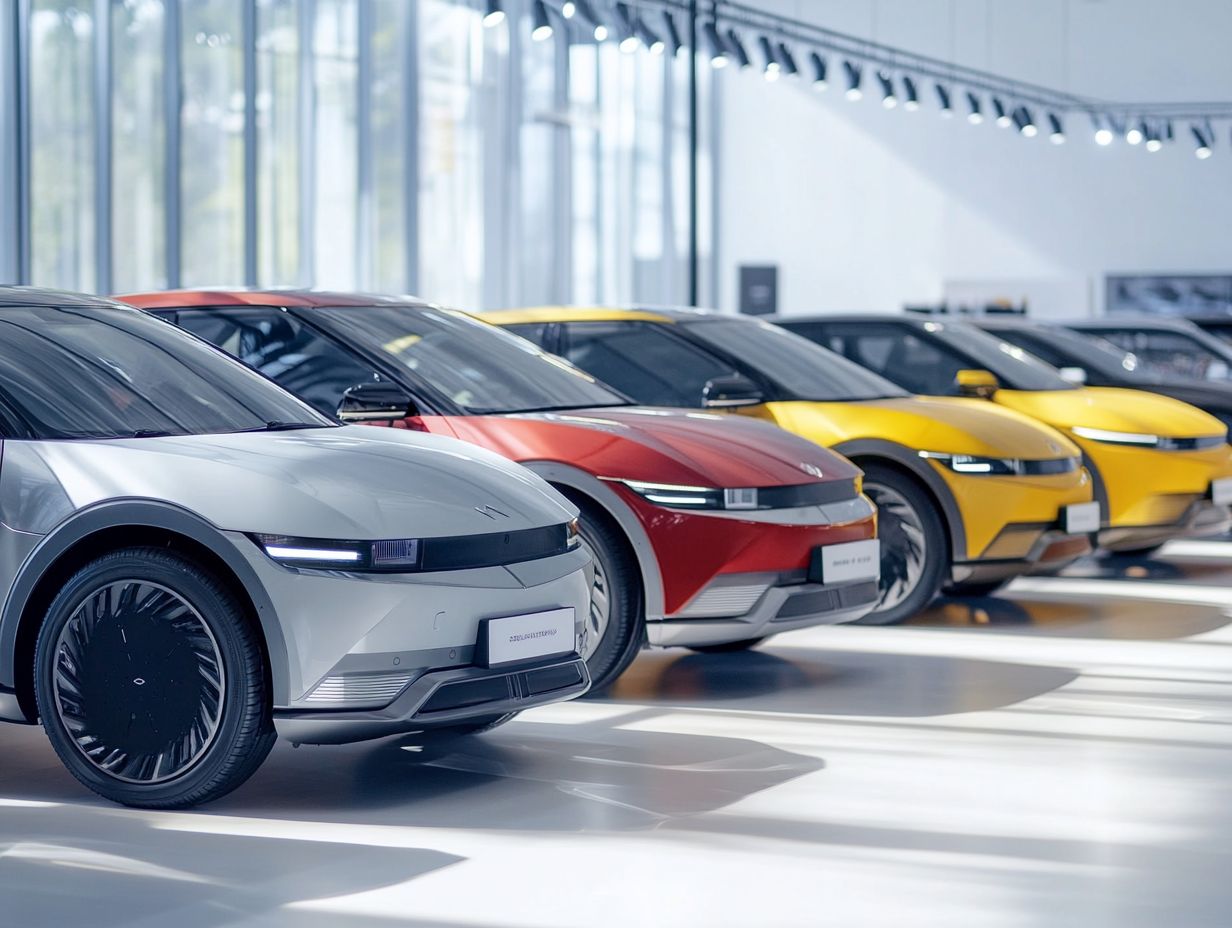
Government incentives, including federal tax credits, play a pivotal role in encouraging you to embrace hybrid car ownership. These incentives make it easier to afford low-emission vehicles, all while contributing to the fight against climate change.
The financial benefits can vary from state to state and may include local rebates or reduced registration fees, significantly amplifying your overall savings as a buyer. Don t miss out on these savings act now while benefits last!
Along with these enticing tax incentives, many regions also offer perks like access to carpool lanes, enhancing your commuting convenience as a hybrid vehicle owner. Some utility companies even provide discounts for charging stations, making the investment in a hybrid even more attractive.
These incentives work together to help you lower your initial purchase costs and enjoy savings over time, positively impacting your budgeting and sustainability goals.
7. Maintenance and Repair Costs of Hybrid Cars
Understanding the maintenance and repair costs associated with hybrid cars is crucial for you as a potential owner. These vehicles uniquely blend conventional gasoline engines with intricate electric motor systems, which translates to varied service needs.
You might think hybrids come with a hefty maintenance price tag due to their advanced technology, but it s essential to delve into the various factors that influence these costs. For instance, battery longevity is often a concern. While replacing a hybrid battery can require a significant investment, advancements in technology are increasing their life expectancy.
Many owners discover that hybrids typically demand less frequent oil changes and other traditional maintenance tasks. Ultimately, grasping these elements will not only provide you with insights into the long-term reliability of the vehicle but also reassure you about the wisdom of your investment decision.
8. Financing Options for Hybrid Cars
Unlocking financing options makes owning a hybrid car exciting and affordable! Various plans, including loans and leasing, can make these fuel-efficient vehicles more accessible.
Understanding the nuances of each option gives you the power to make informed decisions that align with your budget and lifestyle. Traditional auto loans allow you to own the vehicle outright once payments are complete. In contrast, leasing arrangements enable you to drive a new model with lower monthly payments and the advantage of regular upgrades.
Many dealerships and manufacturers offer special financing programs tailored specifically for hybrid vehicles, often including incentives like reduced interest rates or rebates. This can ultimately make it easier for you to transition to more sustainable transportation options.
9. Comparison of Hybrid Car Prices to Gasoline Cars
When you compare hybrid car prices with traditional gasoline models, it’s essential to look beyond the initial purchase price. Consider the long-term savings in fuel and maintenance expenses that come with superior fuel efficiency.
These factors significantly impact the total cost of ownership over time. While hybrids might have a higher sticker price, the reduced frequency of refueling, along with potential tax incentives and rebates, can effectively offset that upfront cost.
Maintenance expenses for hybrids are generally lower, thanks to fewer moving parts in their drivetrains, which translates to reduced repair bills. In situations like long commutes or city driving, where fuel efficiency truly makes a difference, hybrids often present a better good deal.
Ultimately, this makes them a savvy choice for those who are eco-conscious and looking to make a smart investment.
10. Future Predictions for Hybrid Car Prices
Future predictions for hybrid car prices point toward a promising trend of increased affordability. As technology advances and production efficiency improves, these vehicles will become more appealing to a wider range of consumers.
With the rise of automation in manufacturing and continuous advancements in battery technology, you can expect the overall cost of producing hybrid models to decline significantly. As more automakers enter the hybrid market, competition will intensify, pushing prices down even further.
As consumer preferences shift toward sustainable and eco-friendly transportation, demand for hybrids will likely surge. This will compel manufacturers to innovate and streamline their production processes.
These dynamics set the stage for a healthier market where hybrids evolve from being a niche option to the standard choice for many drivers in the coming decade.
Is It Worth It to Invest in a Hybrid Car?
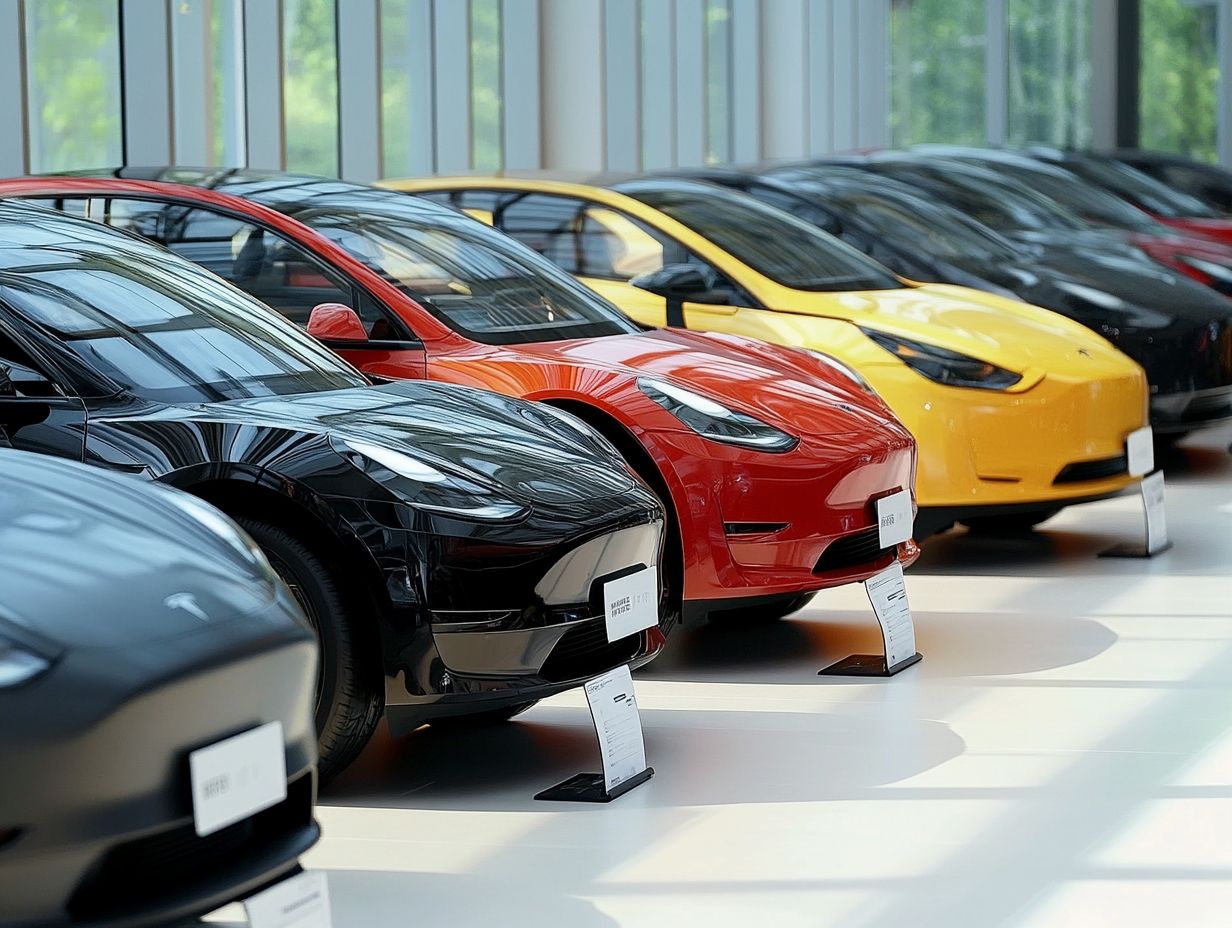
Investing in a hybrid car can be a savvy choice for both your wallet and the planet. It offers long-term cost-effectiveness through impressive fuel efficiency.
By actively contributing to the reduction of greenhouse gas emissions and promoting sustainable transportation, you unlock significant savings at the fuel pump.
While the initial investment may seem hefty, the cumulative savings on fuel costs, maintenance, and potential tax incentives can swiftly balance out those upfront expenses. As governments ramp up support for green initiatives, the allure of hybrid vehicles intensifies!
This aligns your personal financial interests with larger ecological objectives. If you’re weighing immediate costs against future rewards, hybrids are a smart choice for eco-conscious investing.
What Are the Environmental Benefits of Hybrid Cars?
Hybrid cars offer remarkable environmental advantages, including reduced emissions and enhanced fuel efficiency. These factors are vital in the battle against climate change.
By employing a clever combination of a traditional internal combustion engine and an electric motor, these vehicles allow you to consume less fuel and produce fewer pollutants compared to traditional gasoline models.
They emit lower levels of carbon dioxide and other harmful substances, helping to improve air quality in urban areas. While gasoline engines are known for their greenhouse gas emissions, hybrid technology effectively minimizes the overall carbon footprint for drivers like you.
This dual approach benefits the planet and gives you the power to make a transition toward more eco-friendly alternatives. By adopting this mindset, you contribute to a culture of sustainability that could significantly reduce our collective reliance on fossil fuels.
Save Money with a Hybrid Car!
Owning a hybrid car saves you money! These cars use less gas and have lower maintenance costs than regular gas vehicles. It’s truly a smart long-term investment.
You can also enjoy significant savings on fuel expenses, as the dual power sources in a hybrid allow you to drive further on less gas. These vehicles typically require less frequent servicing, which means you ll spend less on repairs and maintenance. Plus, many owners take advantage of government incentives like tax credits and rebates that promote eco-friendly transportation.
When you consider all these factors, it s clear that choosing a hybrid vehicle is not just a wise financial choice but also a positive contribution to the environment!
What Are the Different Types of Hybrid Cars?
There s a world of hybrid cars for you to explore, including conventional hybrids, plug-in hybrids, and those with an all-electric range. Each type is designed to meet your unique needs and preferences.
Conventional hybrids operate mainly on a clever mix of a gasoline engine and an electric motor, switching between the two to optimize how far you can drive on a gallon of gas. This makes them great for city driving, especially with stop-and-go traffic.
Plug-in hybrids offer the added flexibility of charging their battery from an external power source, enabling longer electric-only commutes ideal if your daily drives are shorter.
Then there are hybrids with an all-electric range, allowing you to travel mostly on electricity perfect for those who care about the environment. Each option has its unique benefits, whether it’s better fuel economy or reduced emissions, catering to your lifestyle and driving habits!
What Are the Most Affordable Hybrid Cars in 2024?
In 2024, you’ll discover a range of affordable hybrid cars that deliver exceptional fuel efficiency and a wealth of features perfect for budget-conscious drivers. For those interested in luxury options, be sure to check out the 2024 luxury cars price comparison guide for a look at quality alternatives without sacrificing performance.
As you explore these options, you’ll find various models that not only offer impressive MPG ratings but also include modern technology and comfort. Many of these hybrids come equipped with advanced safety systems and infotainment features designed for the tech-savvy individual!
With competitive pricing, owning a hybrid has never been more accessible! This comparison highlights the top contenders in the market, revealing their unique attributes and how they stack up in terms of performance and financial practicality.
How Can One Negotiate for a Better Price on a Hybrid Car?
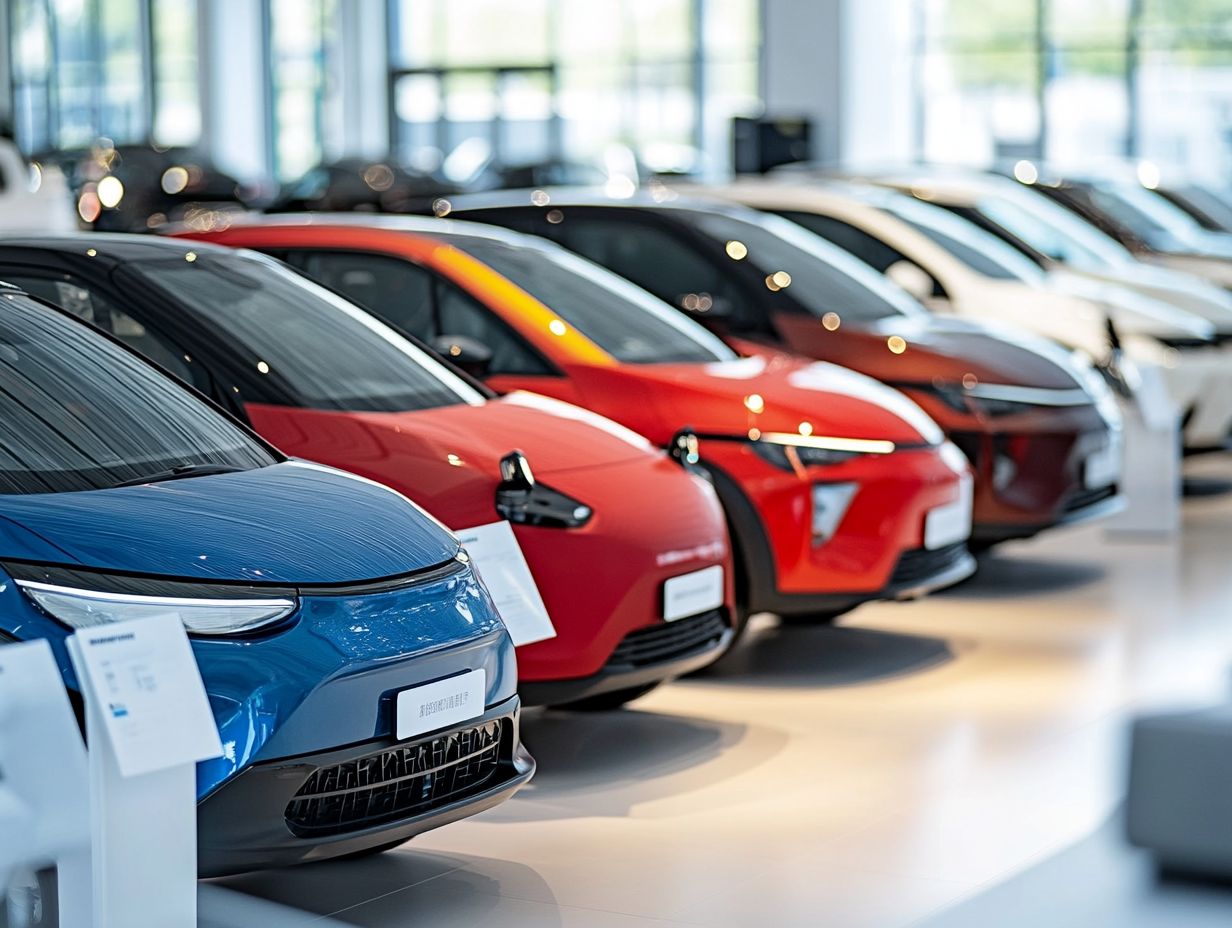
Negotiating for a better price on a hybrid car requires you to be in tune with market trends, thoroughly research financing options, and apply effective strategies at the dealership to secure the best possible deal!
Take the time to analyze comparable models; this insight will reveal competitive pricing and features, putting you in a stronger position. Staying informed about available manufacturer incentives is crucial, as these can significantly affect the overall cost. Being aware of seasonal sales and promotional offers allows you to leverage these opportunities during your price discussions.
Engaging with multiple dealerships and obtaining quotes enhances your bargaining power and provides you with additional leverage during negotiations. Exploring various financing options, including loans and leases, can help you uncover potential savings that may have otherwise gone unnoticed.
Frequently Asked Questions
What are some popular 2024 hybrid cars and their prices?
Some popular 2024 hybrid cars and their starting prices include the Toyota Prius at $25,520, the Honda Accord Hybrid at $27,325, and the Chevrolet Malibu Hybrid at $28,400. For those interested in electric options, comparing prices of top electric vehicles in 2024 can provide valuable insights.
How do the prices of 2024 hybrid cars compare to traditional gas-powered cars?
In general, 2024 hybrid cars are a bit more expensive than gas-powered versions. However, their better fuel efficiency can save you money on gas over time.
Are there any tax benefits for purchasing a 2024 hybrid car?
Yes! There are several tax benefits for buying a 2024 hybrid car, including a federal tax credit that can reach up to $7,500. These benefits can significantly reduce your purchase cost.
Are there extra costs for owning a 2024 hybrid car?
You may also face extra maintenance costs when owning a hybrid car. This includes battery replacements and specialized care for the hybrid parts.
Will the prices of 2024 hybrid cars drop in the future?
While we can t predict the future, many believe prices could drop as technology improves and more hybrid cars become available.
What factors influence the prices of 2024 hybrid cars?
The prices of 2024 hybrid cars depend on various factors, such as the cost of materials, demand for hybrids, and competition between automakers, making it essential to stay informed about car price trends.


